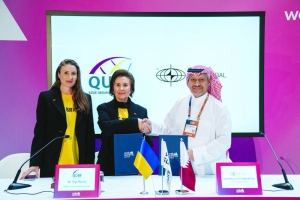‘Qatar’s startup initiatives embrace transformation in tech industry’

Faraj Jassim Abdulla, Director of Digital Economy of the Ministry of Communications and Information Technology (MCIT) at ConteQ Expo 2024
Doha, Qatar: Qatar is currently witnessing tremendous growth in startups and thriving business initiatives as the country’s national strategic vision focuses on embracing the transformation in technology, said an official during the three-day ConteQ Expo 2024, which commenced yesterday at the Qatar National Convention Center.
During a panel entitled ‘Policy unlocks to drive innovation and entrepreneurism’, experts including Faraj Jassim Abdulla, Director of Digital Economy of the Ministry of Communications and Information Technology (MCIT), Rosena Nhlabatsi, Senior Policy Expert at the Qatar Research, Development and Innovation (QRDI) Council, Dr. Leslie A. Pal, Founding Dean of the College of Public Policy at HBKU, and Dr. Jack Lau QSTP President highlighted the importance of building a robust foundation for businesses.
MCIT official, Abdulla stressed that the launch of numerous initiatives in the country reflects that Qatar is shifting towards a technology hub in the region.
He mentioned that the activities coupled with Qatar’s 2030 vision reflect the country’s resilient stance in the sector. Abdulla said: To have a better and prosperous Qatar, it consists of 6 key pillars including digital infrastructure and digital governance, and the policies are fueled by the society.
The expert also lauded Qatar Investment Authority’s $1bn fund of funds as a “major milestone” in Qatar’s ecosystem. MCIT continues to function as its digital Incubation Center supports the startup stage, business ideas, and global firms to invest heavily in the country.
On the other hand, QRDI official, Nhlabatsi stressed the significance of sustaining innovation and growth as key elements to foster entrepreneurship.
She said “Leading up to innovation, we do this using different incentives with more strategic threats. For example, providing funds to different stakeholders, the government sector as well as private sector. So through this kind of incentives innovation.”
“We believe that we can create a resilient country, which is why we can empower it globally with a connected ecosystem and we know that with the work that we do and the innovation frameworks, we are totally aligned,” Nhlabatsi noted. She added that human capital is also pivotal to having the future ready for global innovation and driving an ecosystem that leverages innovation, aligned with QNV 2030. HBKU expert, Pal, reiterated that “Transparent and open relationships in the private sector and the programs that are being offered in universities, are actually delivered, and the modalities most universities have are relatively inflexible.”
He outlined the essentialities of scaling up good governance in public policy in educational systems to meet challenges. He said: “The governmental systems including the quality of regulation, the ease of opening businesses, and the ministries that are developing policies and implementing them really matters”.
“You’re going to attract a lot more innovation and investment than if you are a country at the other end of the spectrum and meets international measures of the quality of governance,” he added.
He further reflected that the central component for fostering for effective innovation in the private sector is ensuring a robust, efficient, and effective public sector.
Related
QUBF launches ‘Qatar-Ukraine Tech and Innovation Committee’
Dr Olga Revina, chairperson of QUBF, and Sheikh Mansoor bin Khalifa al-Thani, fou
Initiative to support digital innovation in Qatar launched
Assistant Undersecretary for Digital Industry Affairs at MCIT Reem Al Mansoori, and General Manager of Microsoft Qatar Lana Khalaf exchanging documents after s
MCIT, Microsoft Sign Partnership Initiative to Support Digital Innovation and…
As part of its efforts to enhance digital innovation and support the growth of startups in the country, the Ministry of Communications and Information Technolog
IIA Qatar hosts session on tech-driven transformation in internal audit
Officials pose during the seminar hosted by Institute of Internal Auditor Qatar Chapter. Doha, Qatar: The Institute of Internal Auditor Qatar Chapter r












